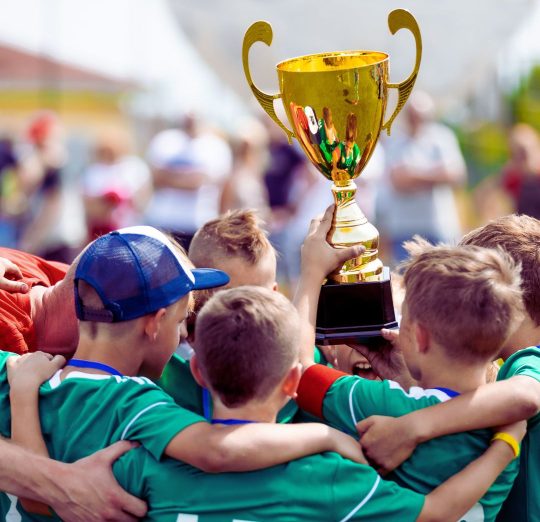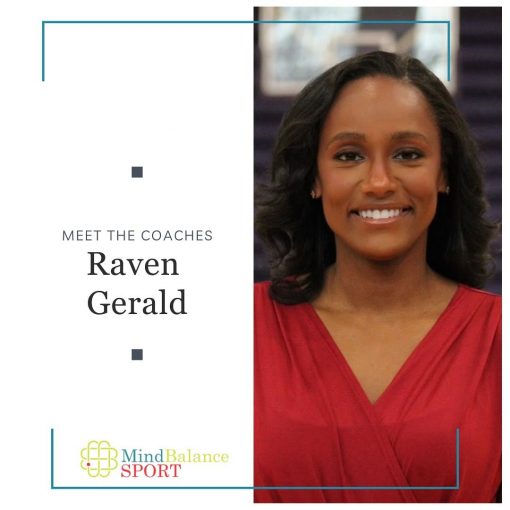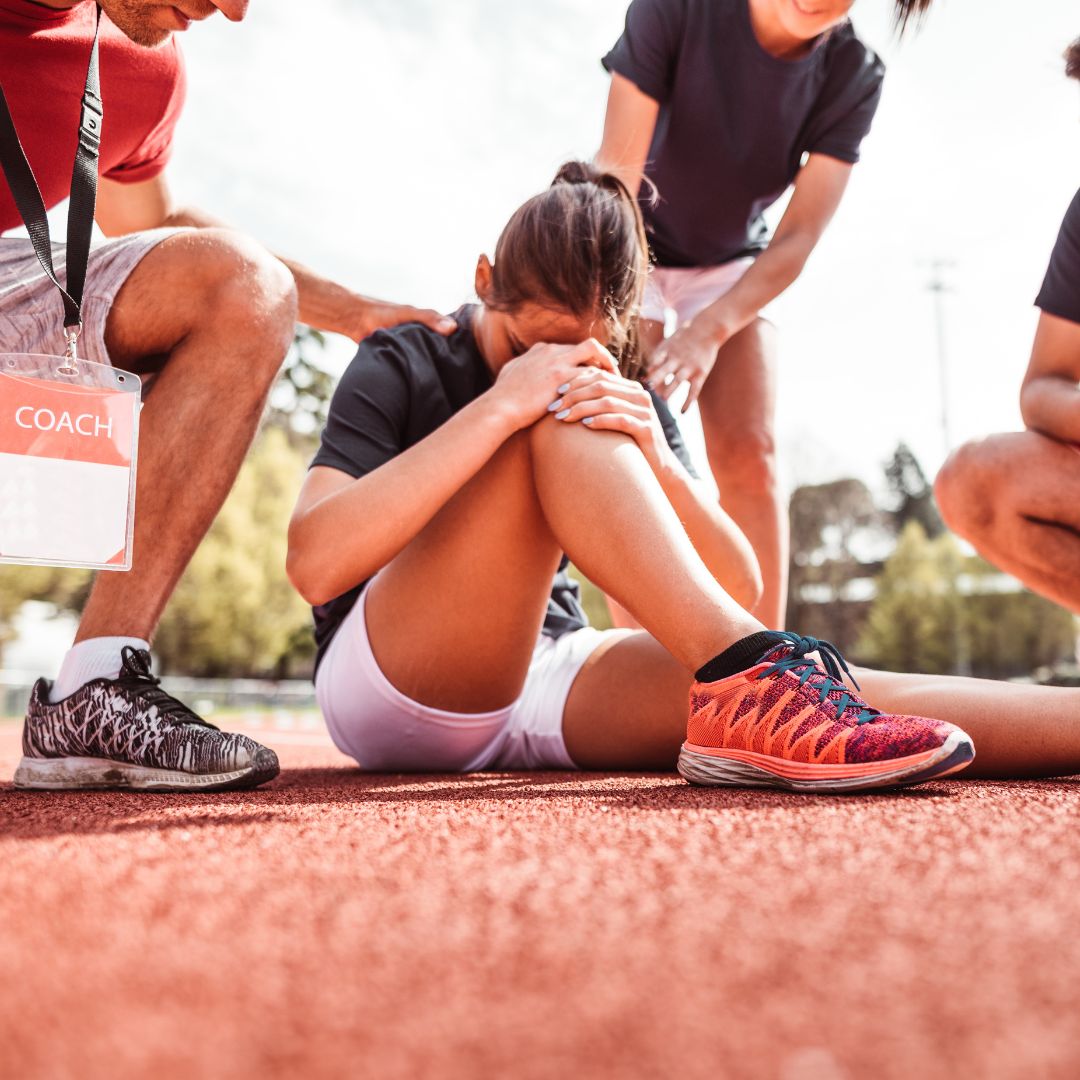Sports Psychologist in Chevy Chase, MD
You want to work on your mental game, but how do you train your brain?
At MindBalanceSPORT, We Train The Other Half Of The Athlete.
You want to work on your mental game, but how do you train your brain?
Mental training does not get much media attention, but at MindBalanceSPORT we know it is a game changer. The mental skills you will learn at MindBalanceSPORT are generalizable in the classroom, in sport and in life!
We know that mental skills can be successfully taught, even at an early age.

Our Services
Meet the Team





testimonials
Athlete Stories: Real Comebacks, Real Results

Emma, a high school basketball player, tore her ACL in the middle of her junior season. After surgery, she struggled with self-doubt and fear every time she stepped back on the court. Through sport psychology training, she learned visualization techniques and confidence-building exercises that helped her regain trust in her knee. When she returned for her senior season, she didn’t just play—she led her team to the playoffs.

Carlos, a soccer player, suffered a stress fracture in his foot and had to miss half of his season. Sitting out was mentally tougher than the pain itself. We worked on mental engagement strategies to keep him sharp—studying game film, setting small rehab goals, and using mental imagery to stay ready. When he was finally cleared, his confidence never wavered.

Jordan, a track athlete, strained her hamstring before a major competition. She feared losing speed and falling behind competitors. Instead of focusing on what she couldn’t do, we redirected her energy toward mental preparation, using self-talk and goal setting to keep her confidence strong. When she returned, she set a new personal record.
EXCELLENTTrustindex verifies that the original source of the review is Google. It was a great help to my 14-year-old competitive volleyball player daughter. Raven was great to understand and connect with her from start to end. We will continue with our sessions as needed.Trustindex verifies that the original source of the review is Google. Great results! I’ve loved working with Paula. Our sessions have greatly improved both the physical and mental aspects of my tennis game. I’m playing better and having more fun! Highly recommend!Trustindex verifies that the original source of the review is Google. Our family had a wonderful experience with Paula Castro. We needed some additional confidence in a particular area/sport and Paula helped get us there. We know who to turn to if we need help again. She’s been a Blessing. Thank you, Paula!Trustindex verifies that the original source of the review is Google. I highly recommend MindBalanceSPORT. Our son works with John Howard. John is very caring, positive, and effective at working with teenagers. John is an adept listener and created an individualized plan tailored to our son’s personality. After just a few sessions with John, we noticed a significant improvement in our son’s motivation and mental approach to sports and life in general. Our son looks forward to meeting with John and tells us that he benefits immensely from their connection.Trustindex verifies that the original source of the review is Google. Paula Castro is an outstanding professional on the field. She has helped my daughter improve her confidence, preparation, and thanks to these session she feels more prepared and motivated. Paula takes the time also to share (what she can) and align with us as parents to be on the same page. Strongly recommended!Trustindex verifies that the original source of the review is Google. MineBalanceSPORT has quickly become the area's expert in sports psychology. Their reputation is well deserved given their incredibly thoughtful, scientifically based approaches to treating performance-related conditions, and I have only heard glowing, positive feedback from those who have engaged in their program. I will also add that Drs. Jones and Chirby presented to us (our group comprises of 15+ doctors and masters level clinicans) about their program and impressed us all with their level of expertise and passion for this field. I give them my highest recommendation.Trustindex verifies that the original source of the review is Google. Dr. Jones was beyond helpful to me throughout our time together. If you are an athlete and you need advice or assistance this is the place to come to. She completely changed my outlook and mindset in a time when I needed her most. I look forward to staying in touch with her and am forever thankful for her expertise.Trustindex verifies that the original source of the review is Google. Paula has been a huge help with my daughter Morgan coming off her injury. It’s been 18 months since she’s played basketball and she’s thriving because I know Paula is guiding her the right direction. As a mother, I’m extremely gratefulTrustindex verifies that the original source of the review is Google. If you are looking for Amazing Psychologists who can help support you in your sports performance, you need to call MindBalanceSPORT! Dr. Chirby and her colleagues are a wealth of knowledge, they have so many helpful techniques for mind balance, and they have so much compassion for the communities that they serve! Highly recommend!!!
Recovery
While Everyone Has A Physical Ceiling, There Is No Mental Ceiling.
How Sports Psychologists in Chevy Chase, MD Enhance Athlete Performance During Challenges
How Sports Psychologists in Chevy Chase, MD Enhance Athlete Performance During Challenges
Sports psychologists play a critical role in helping athletes unlock their potential and maintain peak performance during times of adversity. Whether facing high-pressure situations, recovering from injuries, or navigating mental blocks, these professionals equip athletes with the tools to overcome challenges both on and off the field.
Finding the Right Sports Psychologist Near Me: Understanding Their Role
- Developing Mental Skills: Teaching techniques like visualization, focus control, and mindfulness.
- Emotional Regulation: Helping athletes manage frustration, anxiety, or fear.
- Motivation Enhancement: Cultivating intrinsic motivation to achieve long-term goals.
- Injury Recovery Support: Aiding athletes in coping with setbacks caused by physical injuries.
Addressing Challenges Faced by Athletes
| Challenge | Psychological Impact | Role of Sports Psychology |
| Performance Anxiety | Reduced confidence; physical tension | Teaching relaxation techniques like deep breathing; cognitive reframing |
| Slumps in Performance | Self-doubt; loss of motivation | Identifying underlying issues and setting achievable goals |
| Post-Injury Recovery | Fear of reinjury; emotional distress | Building gradual confidence through progressive exposure exercises |
| High-Stakes Competitions | Increased pressure; overwhelming fear | Training for mental resilience using imagery and pre-performance routines |
Tools Used by Sports Psychologists
- Visualization Techniques: Encouraging athletes to mentally rehearse successful performances for improved execution during real events.
- Goal Setting: Breaking down long-term aspirations into manageable short-term objectives to sustain progress.
- Mindfulness Training: Incorporating meditation or mindful breathing exercises to reduce anxiety levels.
- Positive Self-Talk: Replacing negative thoughts with affirmative statements that foster confidence.
- Biofeedback Systems: Monitoring physiological stress indicators like heart rate or muscle tension for better self-awareness.
Benefits Athletes Gain from Working with Sports Psychologists
- Enhanced focus amidst distractions
- Improved ability to perform under pressure
- Greater emotional stability during setbacks
- Strengthened mental toughness for enduring difficult seasons
As such professionals continue evolving their approaches based on emerging research in sports science and psychology, they remain invaluable allies in maximizing athletic potential while fostering personal growth within competitive environments.
How Sports Counselling in Chevy Chase, MD Helps Athletes Navigate Stressful Events
Sports psychologists play a crucial role in helping athletes manage the mental and emotional challenges that can arise during high-pressure situations. Whether it’s a critical game, a career-defining competition, or the recovery period after an injury, these professionals provide strategies and techniques to help athletes stay focused, composed, and resilient.
Understanding Stress in Sports
- Performance Expectations: Pressure from coaches, teammates, fans, or personal ambitions
Maximizing Athletic Success Through Performance Psychology in Chevy Chase, MD
Mental training techniques are an essential component of modern sports psychology. They play a crucial role in helping athletes achieve peak performance by addressing the psychological factors that influence their physical and mental capabilities. These techniques are used to build focus, enhance resilience, manage stress, and improve overall performance across various sports disciplines.
Key Mental Training Techniques
- Athletes practice imagining themselves successfully performing specific tasks or competing in events.
- This technique enhances motor skills by reinforcing neural pathways linked to physical movements.
- Example: A sprinter visualizing an explosive start off the starting blocks and a smooth finish.
- Establishing short-term and long-term goals ensures motivation and focus.
- Goals should be SMART (Specific, Measurable, Achievable, Relevant, Time-bound).
| Example Goals | Description | |———————–|——————————————–| | Short-term Goal | Completing 10 hours of focused practice weekly. | | Long-term Goal | Qualifying for national championships within two years. | - Positive self-talk builds confidence and reduces negative thought patterns.
- Example phrases: “I am prepared,” “I’ve trained hard for this,” or “I can overcome challenges.”
- Practices such as meditation help athletes stay present during high-pressure moments.
- Deep breathing exercises lower cortisol levels to prevent performance anxiety.
- Directed attention exercises teach athletes how to concentrate on relevant cues while ignoring distractions.
- Example training: A basketball player learning to block out crowd noise during free throws.
Benefits of Mental Training in Sports Performance
- Enhanced Focus: Maintains concentration during critical moments in competition.
- Increased Confidence: Helps athletes trust their preparation and abilities under pressure.
- Stress Management: Reduces burnout and pre-performance anxiety through effective coping mechanisms.
- Resilience Development: Strengthens emotional recovery after setbacks such as injury or loss.
- Improved Consistency: Promotes steady performance by eliminating mental fluctuations.
Real-Life Examples of Success
| Athlete | Sport | Mental Training Impact |
| Michael Phelps | Swimming | Used visualization before races for improved reactions & focus. |
| Simone Biles | Gymnastics | Applied mindfulness to manage stress during international events. |
| Novak Djokovic | Tennis | Relied on breathing exercises for endurance during long matches. |
The integration of these methods into an athlete’s routine fosters sustainable success while equipping them with tools to handle high-pressure situations effectively. By focusing on mental preparedness alongside physical training, sports psychologists enable athletes to unlock their full potential consistently over time.
Enhance Sport Performance Training in Chevy Chase, MD with Expert Sports Psychologists
Athletes often face unpredictable circumstances, whether it’s an unexpected injury, a last-minute change in competition schedules, or adverse environmental conditions. These moments demand not only physical adaptability but also mental resilience. Sports psychologists play a crucial role in equipping athletes with tools and strategies to navigate uncertainty effectively.
Understanding the Psychological Impact of Uncertainty
- Increased mental fatigue: Worry about uncontrollable factors drains cognitive energy.
- Decreased focus: Athletes may fixate on uncertainties rather than task-specific performance cues.
- Negative self-talk: Stressful events can trigger critical inner dialogue that hinders confidence.
Sports psychologists help athletes recognize these responses and address them constructively.
Techniques for Managing Uncertainty
- Focuses on reframing negative thoughts into positive or neutral interpretations.
- Example: Instead of “I’m unprepared for this change,” an athlete could think, “This is an opportunity to demonstrate my versatility.”
- Teaches athletes to stay present in the moment rather than worry about uncertain outcomes.
- Exercises such as deep breathing or body scanning are commonly used to reduce anxiety.
- Involves imagining success within unpredictable scenarios.
- For instance, picturing oneself performing well despite external challenges trains the brain for confidence in similar real-life situations.
- Encourages flexibility by helping athletes set adaptable process-focused goals rather than rigid outcome-based goals.
| Situation | Traditional Goal | Adapted Goal |
| Competition delay | Finish first place | Maintain strong pacing strategy |
| Sudden weather changes (e.g., rain) | Achieve personal best time | Focus on consistent form |
| Late roster changes | Outperform specific opponent | Execute strategic plays effectively |
Case Study Approach
- Example: During a major tennis tournament, a player faced unexpected delays due to weather interruptions. With guidance from their sports psychologist, they incorporated mindfulness into their warm-up routines and adjusted their focus from predicting match timing to optimizing recovery during downtime.
Such examples highlight how targeted psychological preparation allows athletes not only to cope but also thrive amidst uncertainty.
Benefits of Psychological Preparedness in Unpredictable Events
- Enhanced ability to remain composed under stress.
- Increased confidence when facing unfamiliar or adverse conditions.
- Improved problem-solving skills through mental flexibility.
Ultimately, this level of preparedness enables athletes to stay competitive even when circumstances don’t go as planned.
Effective Techniques from a Sports Mental Coach in Chevy Chase, MD to Build Athlete Confidence and Resilience
Sports psychologists play a vital role in equipping athletes with the mental tools necessary to thrive under pressure and bounce back from setbacks. Their expertise is particularly critical for building confidence and fostering resilience, which are essential for peak performance. Below are some of the key strategies utilized by sports psychologists to enhance these attributes.
1. Goal Setting for Focus and Motivation
Clear and realistic goal setting is a cornerstone of building confidence. Sports psychologists often guide athletes through the process of creating SMART goals (Specific, Measurable, Achievable, Relevant, Time-bound), ensuring they remain focused on tangible milestones.
- Short-term goals: Help athletes maintain momentum during training or recovery.
- Long-term goals: Provide a vision for sustained effort and achievement.
- Regular review of progress helps athletes see their growth over time, reinforcing self-belief.
2. Visualization Techniques
Visualization involves mentally rehearsing successful outcomes or specific skills. This practice improves an athlete’s confidence by allowing them to “experience” success before it happens in reality.
- Creating detailed mental imagery of competing successfully.
- Practicing scenarios that simulate high-pressure moments to improve emotional regulation.
- Enhancing muscle memory by combining visualization with physical practice.
3. Cognitive Restructuring
Negative self-talk can undermine confidence and resilience. Sports psychologists help athletes identify and replace unhelpful thought patterns with constructive ones through cognitive restructuring techniques.
For example: | Negative Thought | Positive Replacement | |—————————|———————————————-| | “I always fail under pressure.” | “I’ve trained hard; I can handle this.” | | “I’m not as good as my opponents.” | “I’m prepared to compete at my best.” |
This shift helps athletes build a strong internal dialogue that supports rather than hinders performance.
4. Mindfulness and Relaxation Training
Mindfulness techniques encourage athletes to focus on the present moment rather than dwelling on past mistakes or worrying about future outcomes. Relaxation methods also reduce stress levels that can impede performance.
Key practices include: – Breathing exercises for managing pre-performance anxiety. – Progressive muscle relaxation (PMR) to release physical tension. – Meditation sessions designed to strengthen concentration and emotional stability.
5. Developing an Optimistic Mindset
Resilience often stems from an optimistic outlook, especially in challenging situations such as injury recovery or losing streaks. Sports psychologists work with athletes to reframe setbacks as opportunities for growth rather than failures.
Techniques include: – Journaling positive experiences after each training session or competition. – Focusing on controllable factors like effort instead of uncontrollable elements like luck or referee decisions.
6. Building Social Support Networks
Having strong support systems contributes significantly to resilience by providing encouragement during tough times. Sports psychologists often advise athletes on cultivating meaningful relationships with coaches, teammates, family members, or mentors who can reinforce their self-worth and determination.
Confidence and resilience are not innate traits but skills that can be developed with consistent effort and guidance from professionals like sports psychologists. By implementing these strategies into their routines, athletes gain the psychological edge required to excel both on and off the field—regardless of the challenges they face along the way.
How Sports Psychiatry in Chevy Chase, MD Helps Elite Athletes Achieve Mental Preparedness
Sports psychologists play a critical role in shaping the mental preparedness of elite athletes, ensuring they maintain focus, resilience, and composure under pressure. Mental preparedness is often what separates good athletes from great ones, particularly when competing at the highest levels. Below is an exploration of how sports psychologists influence this vital aspect of athletic performance.
Understanding Mental Preparedness
Mental preparedness refers to an athlete’s ability to manage their mindset effectively before, during, and after competition. It encompasses focus, emotional regulation, positive self-talk, and adaptability. Sports psychologists employ evidence-based techniques to build these skills in elite athletes.
Key Components of Mental Preparedness:
– Focus: Maintaining attention on goals despite distractions.
– Emotional Regulation: Controlling nerves or anxiety during high-stakes situations.
– Confidence: Cultivating belief in one’s own abilities.
– Resilience: Bouncing back from failures or setbacks quickly and effectively.
Techniques Used by Sports Psychologists
- Work with athletes to define clear short-term and long-term goals.
- Employ imagery training to help athletes rehearse success scenarios in their minds before stepping onto the field or court.
- Identify negative thought patterns that may hinder performance.
- Teach athletes how to replace self-defeating thoughts with constructive affirmations and mental frameworks.
- Introduce relaxation exercises like progressive muscle relaxation (PMR) or mindfulness meditation to reduce pre-performance anxiety.
- Breathing techniques designed for calming nerves are often integrated into training routines.
- Help athletes develop coping mechanisms by exposing them incrementally to stress-inducing scenarios during practice sessions.
- Use role-playing exercises or simulations that mimic high-pressure situations like penalty kicks or tie-breaker matches.
The Role of Individualization
| Sport | Typical Challenges | Tailored Psychological Preparation |
| Tennis | Dealing with solo pressure during games | Focus-building drills for sustained concentration |
| Soccer | Handling team dynamics during critical matches | Group cohesion exercises paired with individual mindfulness practices |
| Gymnastics | Perfectionism under intense scrutiny from judges | Visualization techniques emphasizing positive reinforcement |
By customizing approaches, sports psychologists ensure that each athlete receives targeted strategies aligned with their unique needs.
Building Pre-Competition Routines
Pre-competition routines are essential for establishing consistency and reducing uncertainty before events. Sports psychologists help elite athletes develop structured rituals that may include:
– A specific warm-up sequence designed for focus enhancement. – Engaging in relaxation exercises right before taking the stage. – Reviewing individualized motivational phrases or mantras.
These routines create a sense of familiarity even when competing in unpredictable circumstances, helping athletes feel grounded as they perform at their best levels.
Shaping mental preparedness is a dynamic process requiring close collaboration between sports psychologists and the athlete themselves. Through tailored interventions such as goal setting, behavioral training, stress management techniques, and pre-performance routines, these professionals equip elite competitors with the tools needed to excel mentally as well as physically under any circumstance they encounter on their journey toward excellence.








